Dina Iordanova reports:
This festival in Paris (which is one out of several) seems to have been running for about ten years now. It takes place in late October and features a combination of recent films, archival finds, a programme of shorts, animation, and workshops. Like is the case of many similar events, and even if formally run by a ‘foundation, i’s seems to be a one-person project of a woman called Deanna Gao who I did meet and spoke with. She is mixed race (British mother and a Chinese father), and an artist (http://www.deanna-gao.com), so her interest in film is a secondary occupation. Sponsorship is clearly directly from the PRC. Based in the prestigious and costly in the 16th arrondissement, Ms. Gao has established very good connections locally in Ile-de-France as she had some French film people of solid reputation involved (like Serge Bromberg of Lobster films, who is a respected silent cinema specialist and who runs his own cable TV show on one of the paid channels), as well as with the archives which carry a lot of interesting and rarely seen material. This year the highlight of the programme was the panorama of early documentaries, from the 1930s and 1940s, of director Sun Mingjing (1911-1992).
What I found most fascinating, however, was the geography of theatres where this event was held (in the ‘salle japonais’ at La Pagode mainly, and then Max Linder and Le Lincloln, I think, all securely far away from any Chinatowns and concentrations of Chinese populations). I did ask Ms. Gao why she has not picked up theatres closer to where the diaspora lives, and she said something to the effect that no, she would not do such a thing, these festivals are not meant to be for the Chinese only. However, the two screenings I attended (one in the afternoon, half empty – even if hugely interesting for me – and the other one in the evening, full) were both mainly attended by smartly dressed Chinese with dark-rimmed glasses who looked more on the intelligentsia side to me. Very few French or Caucasian (and those who were there, as is usually the case, clearly had some other vested motive for attendance, besides sheer interest in what was on show). It was notable that the other film which the cinema was running in the second theatre – – suitably named Un Chateau en Italie (by Valeria Bruni-Tedeschi, sister or Sarkozy’s Carla Bruni) – had a sizeable group of (white upper class Parisian) viewers lining up for tickets at the same time. I wish I could tell you more about this aspect (the importance of picking up the theatres) as this was most interesting for me in my current context (I am doing a book on cinemas in Paris next) but it will have to wait for some other opportunity. My interest on the matter of La Pagode is linked with the claim of my friend Aude Hesbert, director of the festival Paris cinema, that this cinema is so conservative in its programming that it is not worth it including it for consideration – and not least because it was the sole cinema left in the wealthy 7th arrondissement (whereas the nearby St Germain and Quartier Latin count between themselves a total of nearly 30 cinemas).
In any case, La Pagode, tucked away in a quiet street not far from the upscale shopping destination of Bon Marche (one of Paris’ secrets that are kept well away from the tourist trail), is a cinema which has a history similar to Taj Mahal. It is an ambience that has nothing to do with the atmosphere in the 13th arrondissement or in Belleville. In spite the numerous video stores, these truly Chinese areas in Paris currently do not have a suitable cinema that would showcase cinema from the region — but I understand from friends that there was a Chinese-language cinema in the 13th arrondissement, on Tolbiac near the corner with avenue de Choisy — where now mainly the Vietnamese quarter is — which was screening non-subtitled films back in the 1960s and the 1970s. But this is now long gone.
I was able to see two films on the opening day, of which one was a premiere of a mainstream resistance-comedy-thriller-cum-martial arts (in the presence of the festival’s ‘ambassador,’ a Chinese actress who had just arrived from a similar cinematic-diplomatic mission in Brazil (and whose photo with Ms. Gao I attach here). The other one, which was inconspicuously scheduled in the afternoon, however, I found extremely interesting — a truly intriguing tale of China’s new raising class of capitalists — in this case educational entrepreneurs who take on the HE establishment in the US, called AMERICAN DREAMS IN CHINA (directed by Peter Chan and shot by Christopher Doyle). It evolves around matters of countering Orientalism, even if somewhat heavy-handedly, boosting self-esteem, and turning the table on the West on the matter of who is calling the shots. I was left with the impression it is based on a real story as at the end of the film the photos of the real protagonists run behind the credits.

